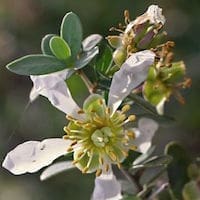I see the allergies to the fragrances in things we put on our skin every day in my office in the form of skin reactions, such as itching, hives and other types of rashes. Almost every time, like clockwork, my first question is:
“What are you using on your skin?”
The word “fragrance” listed as an ingredient on cosmetic products most often means a synthetic, man-made chemically-created scent added to a soap, shampoo, face cream and of course, laundry detergents and fabric softeners. Sometimes these fragrances mimic a natural fragrance such as rose or orange and sometimes they create scents that cannot be extracted from an original, real source such as bubblegum.
In contrast, natural essential oils are extracted (usually steam distilled or pressed) from some part of a plant such as its bark, leaves, flowers, peels or roots.

To avoid allergies to synthetic fragrances, I chose to use therapeutic grade essential oils in our soaps. None of our soaps have commercial fragrances.
Proven by science, added with love
While essential oils lend fragrance, they also offer skincare and aromatherapy benefits, proven by science, because they retain the characteristic fragrance or active ingredient of the original aromatic medicinal plant.
Aromatherapy is one of the complementary and alternative medicines which has been used to treat various diseases and symptoms. That’s because essential oils have been found to impart many kinds of drug-like actions such as antimicrobial, sedative, analgesic and others. Various essential oils such as jasmine, frankincense, peppermint, lavender and orange have been proven in scientific and medical studies to relieve depression and anxiety. 
It’s that added therapeutic potential from the essential oils which brings each bar of soap to an even higher level. That’s where art and science unite in soap-making.
Learn about the essential oils you’ll find in different bars of Soap101:
German chamomile in Stressed Skin Remedy
Of all single species herbal remedies of local, indigenous and native peoples studied, German chamomile was found to be one of the most widely used therapeutic herbs. It has skin-soothing, anti-inflammatory, healing and antioxidant benefits. It’s comforting fragrance has been shown to soothe and clear the mind. German chamomile is steam distilled from flowers and its key constituent is bisabolol oxide A, known to have anti-irritant, anti-inflammatory and antimicrobial properties. Its rich blue color comes from the aromatic component chamazulene, a blue-violet derivative of azulene. Relaxing German chamomile helps maintain skin health by alleviating acne, eczema and dermatitis.
Orange in Mother’s Recipe
In contrast to most essential oils, orange essential oil is cold pressed from the rind of the fruit. Composed of mostly of limonene, the component which gives citrus fruits their familiar aroma, orange essential oil is known for it’s mood-boosting effects when inhaled. Studies have shown that citrus fragrances, like orange, enhance immunity, promote relaxation and decrease depression. In addition, uplifting orange essential oil and it’s active ingredient limonene, ameliorates oily skin and helps brighten a dull complexion. This essential oil also has anti-tumoral and tissue repair properties and may improve the appearance of skin wrinkles.
Basil in Face Food
Basil is a less stimulating, but still vibrant, member of the mint family that has been used extensively in traditional Asian and Indian medicine to treat migraines and chest infections. This fragrant essential oil is an effective antibacterial agent against a broad range of microorganisms on the skin, as well as a calming muscle relaxant. Basil essential oil soothes insect bites and stings and has been used for its antiviral, anti-inflammatory and antispasmodic qualities; it’s zestful scent alleviates mental fatigue.
Cedarwood in Skin Spa
Inhaling fragrances has been proven to affect the sympathetic nervous system, which accelerates the heart rate, constricts blood vessels, and raises blood pressure. Some oils were found to raise this activity and other oils were found to reduce this activity. Cedarwood is the latter, used for its relaxing effect. Throughout time, cedarwood has been used in medicine to treat hair and skin conditions, such as alopecia areata, dandruff, acne, psoriasis and oily skin. Cedarwood essential oil is recognized for it’s calming and pacifying fragrance, it’s comforting scent eases tension and decreases anxiety.
Grapefruit in Intoxicating Skin Saver
Grapefruit essential oil, like orange essential oil, is high in limonene, giving it known antiseptic, detoxifying and diuretic-like properties. This essential oil is cold-pressed from the rind of the grapefruit and has a refreshing and stimulating scent. Studies have shown that citrus fragrances, like grapefruit, heighten immunity, encourage relaxation and curtail depression. Grapefruit essential oil effectively cleans oily skin, has been used to treat acne and may improve the appearance of cellulite.
Rose in For the Love of Soap
Rose essential oil is distilled from the flower of the Damask rose, the most fragrant type of rose. This oil, with its undeniable scent is invigorating and aphrodisiac-like, uplifting the mind and spirit. Rose essential oil is anti-inflammatory and has been used to treat wrinkles and prevent scarring.
Could essential oils be what’s essentially missing from your current soap?


